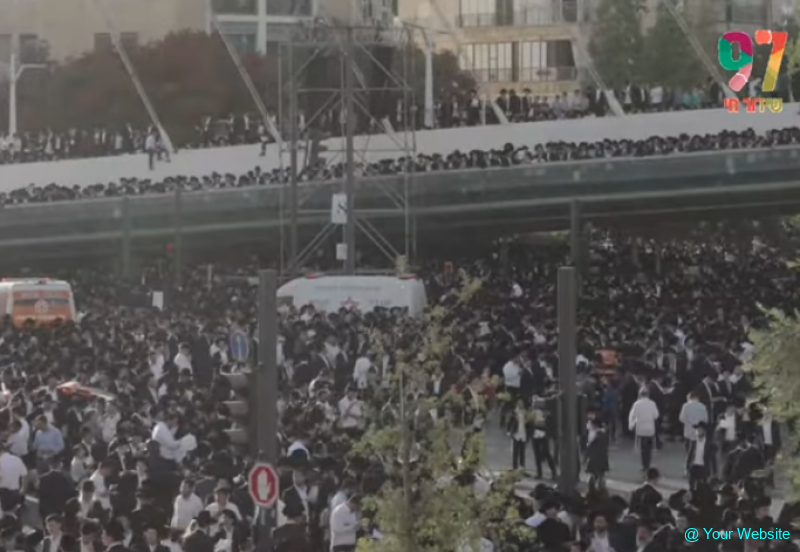
For nearly two hours on Thursday evening, hundreds of thousands of ultra-Orthodox (Haredi) demonstrators filled the entrance to Jerusalem, reciting Psalms and Slichot prayers led by rabbis from the Lithuanian, Hasidic, and Sephardic streams.
Despite the massive turnout, no clear message emerged from what organizers had called a “unity rally” — a reflection of the sharp internal disagreements dividing Haredi leadership over the military draft and relations with the government.
The statement of resolutions released after the rally declared that “the Torah is the protector of the people and the land,” and that it would be “unthinkable to restrict those who wish to study Torah.”
It also protested the arrest and imprisonment of yeshiva students, calling such acts a “serious violation of freedom of religion and choice,” and accused the legal establishment of “boldly fighting against the Torah.”
Yet the declaration did not directly criticize the Israeli government. Instead, it expressed only “pain” that the government had not prevented “this shameful situation.”
Sources said this wording reflected a tense compromise: Gur Hasidic leaders and Minister Yitzhak Goldknopf had pushed for an explicit attack on Prime Minister Benjamin Netanyahu, while Shas demanded to avoid mentioning the government altogether. Ultimately, Lithuanian leader Rabbi Dov Landau approved a softened version.
“A Leadership Crisis”
With no speeches permitted — a result of internal power struggles — the rally ended as it began: orderly but directionless.
“It was very impressive in size,” one organizer told Haaretz, “but the lack of speeches made it hollow. We couldn’t agree on the right message.”
The event underscored what many insiders now describe as an acute leadership vacuum within Haredi society. Senior rabbis and politicians sat separately, surrounded by their factions, while aides competed for photo opportunities in a show of influence.
Discontent and Frustration Among Participants
Many participants expressed frustration with the logistics — poor organization, lack of toilets, and long uphill walks after buses dropped crowds far from the site.
“I have no idea how I’ll even get home to Bnei Brak,” said one elderly attendee, resting on the curb.
Among the sea of young faces — the average age was estimated at 17 — a few spoke candidly about their doubts regarding the draft issue.
“My father wants me to join the army,” said one youth. “If they insist, I’ll go. Our fathers served; we respect the soldiers.”
His friend added, “There are secular people who don’t enlist too, but only Haredim get blamed.”
Internal Tensions Over Conscription and Shas
The rally also exposed deep rifts within Haredi politics. Posters (pashkevilim) distributed at the event attacked Shas leader Aryeh Deri, accusing him of “selling out yeshiva students” by supporting draft compromise proposals linked to Likud MK Boaz Bismuth.
One poster read: “Deri, Maran looks down on you — stop grieving my soul by selling my sons to the army.”
Within the Haredi world, debate continues over whether youths from weaker educational backgrounds should quietly enlist to meet IDF quotas and protect elite yeshiva students — or whether all conscription should be opposed without compromise.
Scuffles and Isolated Clashes
While the event was largely peaceful, tensions flared on the sidelines. Extremists attacked two Haredi soldiers wearing IDF uniforms despite holding signs expressing solidarity with yeshiva students.
Police quickly intervened and extracted them safely. In another case, protesters defended a soldier from assailants, escorting him to safety at Jerusalem’s closed central bus station.
As the rally ended, small groups of radicals clashed with police, providing a volatile conclusion to what was billed as a spiritual show of unity — but ended as a mirror of fragmentation within ultra-Orthodox society.
Analysis: A Massive Crowd, a Hollow Core
Despite the turnout — organizers claimed a quarter of a million participants, possibly the largest Haredi rally in Israel’s history — observers agreed the event failed to project direction or leadership.
“The rabbis said to come, so I came,” said one participant simply.
His words, echoing across the crowd, captured the essence of the evening: obedience without vision — and a movement struggling to redefine its identity amid growing internal and national pressures.
Articles Archive
Top Categories
ABOUT IFI TODAY

Lorem ipsum dolor sit amet, consectetur adipisicing elit, sed do eiusmod tempor incididunt ut labore et dolore magna aliqua. Ut enim ad minim veniam, quis nostrud exercitation ullamco laboris nisi ut aliquip ex ea commodo consequat. Duis aute irure dolor in reprehenderit in voluptate velit esse cillum


Comments